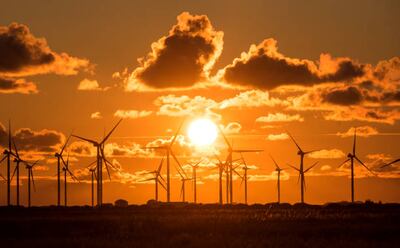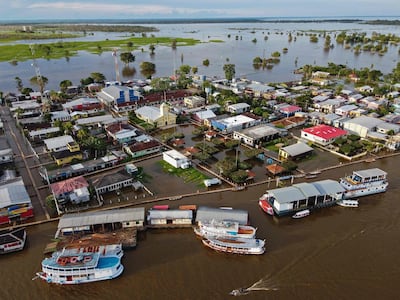The world has a narrow and rapidly closing window to ward off catastrophe caused by climate change, a long-awaited UN report has said.
In the five scenarios put forward by experts, the target of limiting the global temperature rise to 1.5°C above pre-industrial levels would be breached in the 2030s. Already, temperatures have soared by about 1.1°C since the 1850-1900 period.
The study says it is already too late to head off some of the effects of global warming, such as melting ice sheets and rising sea levels.
Valerie Ms Masson-Delmotte, co-leader of the working group behind the report, said that “changes in ice sheets, deep ocean temperature and acidification will continue for centuries to thousands of years, meaning that they are irreversible in our lifetime and will continue for generations to come".
UN Secretary General Antonio Guterres described the report as a “code red for humanity”.
UN experts say that half a degree of extra warming — 2°C instead of 1.5°C — would have effects on the planet that are far more severe.
Under the 2015 Paris Agreement, countries aim to keep the increase in global temperatures to less than 2°C above pre-industrial levels, and strive to limit the increase to 1.5°C.
Even if 1.5°C is met, there would still be an increase in the intensity and seriousness of heatwaves, storms, droughts and floods.
The report, compiled by more than 200 experts, said tropical cyclones are getting stronger and wetter, while Arctic sea ice is dwindling in the summer and permafrost is thawing. All of these trends will get worse, it said.
Countries are under pressure to agree on ambitious action at this year’s Cop26 summit in Glasgow, Scotland.
Monday’s report by the Intergovernmental Panel on Climate Change gives them the first comprehensive update since 2013 on what the science shows.
After the 2013 report said it was extremely likely that humans were causing climate change, this year’s study says the evidence is “unequivocal".
It says that human activity has heated the world at a rate that is unprecedented in at least the last 2,000 years.
Signed off after long negotiations between IPCC delegates, it says that every fraction of a degree counts in preventing climate-related disasters.
Mr Guterres said he was counting on governments to make a success of Cop26 and to meet their promises of climate funding for the developing world.
“The alarm bells are deafening, and the evidence is irrefutable: greenhouse gas emissions from fossil fuel burning and deforestation are choking our planet and putting billions of people at immediate risk,” he said.
“Extreme weather and climate disasters are increasing in frequency and intensity. That is why this year’s [Cop26] in Glasgow is so important.
“If we combine forces now, we can avert climate catastrophe. But, as today’s report makes clear, there is no time for delay and no room for excuses.”
Ms Masson-Delmotte said scientists had a much clearer picture than before of the current and future state of the climate.
“It has been clear for decades that the Earth's climate is changing, and the role of human influence on the climate system is undisputed,” she said.

Extreme weather
If global warming reaches 2°C above pre-industrial levels, extreme heatwaves are expected to happen 14 times more often than before.
Droughts would be two to three times more likely, while extreme rainfall would be 70 per cent more common, the report said.
The only way to prevent this, scientists say, is to cut greenhouse gas emissions to zero — which leading economies hope to do by 2050.
As well as cutting carbon dioxide emissions, countries could also limit global warming by reducing methane pollution, the report said.
Methane concentration in the atmosphere is estimated to be higher than at any point in the past 800,000 years.
If these reductions do not take place, temperatures will rise by more than 2°C above pre-industrial levels by the end of this century, scientists believe.
Limiting the increase to 1.5°C could be reached as soon as the 2030s — but it could be prevented from rising further if pollution falls to zero, the report said.
In the five scenarios put forward by experts, the most optimistic is that the 1.5°C limit is temporarily breached but that temperatures then fall slightly.
However, they say that some effects of climate change are already locked in by the warming that has taken place so far.
Even if temperatures stabilise, ice sheets will continue to melt and sea levels are expected to keep rising beyond 2100.
Flooding events that used to take place once a century could become annual occurrences because of rising sea levels, it is feared.

Experts say the challenge of limiting warming to 1.5°C is political rather than physical, with countries facing difficult negotiations over how to cut emissions.
Dozens of countries missed a July 31 deadline to submit their updated climate plans to the UN, which said this was unsatisfactory.
As host of Cop26, the UK is pushing for net zero targets but faces criticism over its own efforts to battle climate change.
The EU faces years of political wrangling over a climate plan put forward last month that aims to halve emissions by 2030, compared with 1990 levels.
Climate change has been widely blamed for recent extreme weather events in Europe, with bushfires in Greece and Turkey, and severe flooding in parts of Germany.
Early drafts of the UN report received more than 80,000 comments from reviewers and government representatives.
Monday’s report is only one part of what will go into the final Sixth Assessment Report, which will be released in 2022.
This will include further chapters on the effects of climate change on societies and on ways of curbing emissions.









